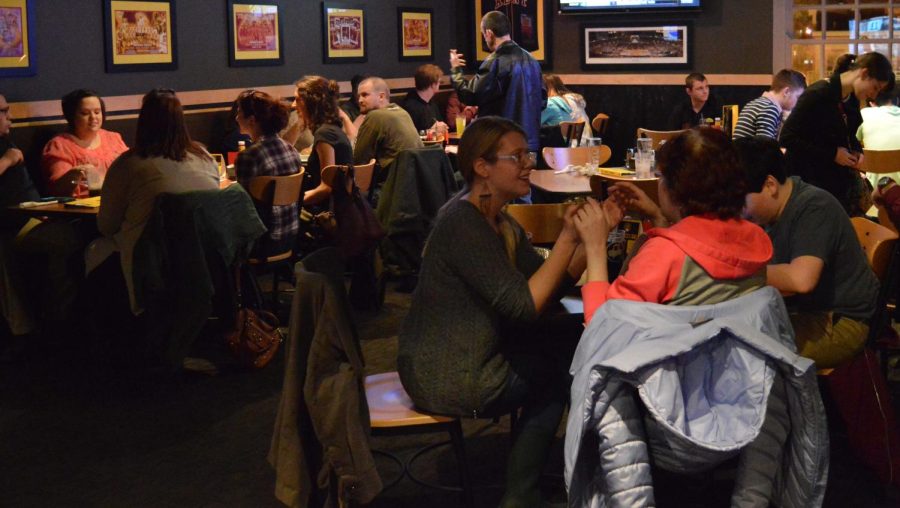Deaf community hosts Deaf Night Out
People attending Deaf Night Out wait for their food at downtown Kent’s Buffalo Wild Wings on Feb 3. 2016.
The first of many Deaf Night Out events (DNO) for the spring semester took place on Feb. 3. DNO is held the first and third Wednesday of each month at the downtown Kent Buffalo Wild Wings starting at 7:15 p.m.
DNO events are an opportunity for members of the Deaf community (capital D denotes a community) to gather and speak using American Sign Language (ASL). Participants meet on the second floor of Buffalo Wild Wings and have the option to walk around and socialize or to sit down at a table. Each designated DNO table has a red flag to notify servers when it’s ready to order food.
Adam Stoffer a deaf community member from Kent explained how beneficial DNO is to him.
“DNO gives me the opportunity to have social experiences with my native signing hands,” Stoffer said.
Deaf Night Out brings together members of a Deaf community from Kent and Akron plus family members, ASL majors, deaf education majors, professional and student ASL interpreters. Attendance ranges from 30 to 160 people and typically attendance is highest during the middle of the semester.
“Interaction is the most important (aspect) there, and it’s a great environment for that.” said Nicole Miller, a DNO committee member and interpreter for Kent State.
The Kent DNO was started by Shawn McPherson, a senior digital media production major, and Ryan Capron, a 2013 Kent State alum. DNO is now planned by a committee of six. DNO was inspired by other deaf events occurring throughout the country, including Northeast Ohio, but created to provide events closer to the Kent and Akron area.
Kent State alumnus Ron Huish said, “DNO gives me a chance to use my ASL skills that I learned as a student at KSU in a real way. Also I enjoy the Deaf community.”
The Deaf community has become more connected through technology but still prefer in person communication, and DNO provides social interactions for the community. DNO also gives ASL students an outlet to practice and become more exposed to Deaf culture.
“We still value and cherish time together in person because we’re usually isolated on a daily bases because the majority of the world is hearing,” said Keri Horowitz a Deaf DNO committee member. “Not only does it help interpreting students and anyone else who’s interested, but really it’s great for deaf people themselves to have a sense of belonging.”
Julie Riedel is a student life reporter for The Kent Stater Contact her at [email protected].



